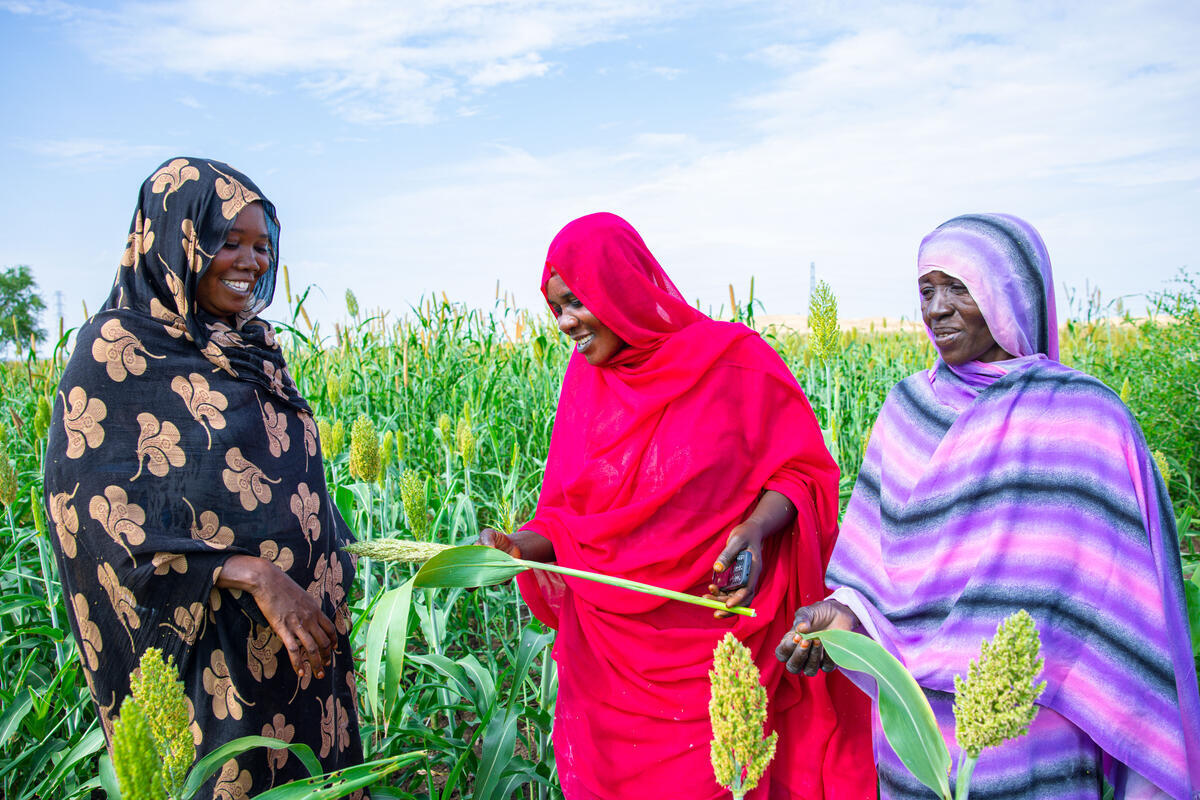How farmer registries can drive the expansion of inclusive social protection

©FAO/Mahmoud Shamrouk
09/12/2024
The Food and Agriculture Organization of the United Nations (FAO) has been at the forefront of supporting countries in developing and enhancing farmer registries to improve agricultural policies and programmes and strengthen resilience to climate shocks, economic instability, and food crises.
Farmer registries are also essential for enhancing social protection coverage and comprehensiveness for rural populations, facilitating the systematic collection, storage, and management of critical data on land use, crop production, and socio-economic conditions among others. When effectively implemented, interoperable farmer registries are a key tool for planning and coordination across the social, economic, and agricultural sectors.
In Zambia, for example, the Zambia Integrated Agriculture Management Information System (ZIAMIS) has registered over one million farmers, connecting them to agricultural input programmes and digital financial services. Similarly, Lebanon has used its farmer registry to provide targeted support during the economic crisis and COVID-19 pandemic, showcasing the potential of farmer registries as a basis for crisis response and social protection.
Despite these successes, there is still a strong need for a guiding framework to inform the implementation of farmer registries across countries, improving data governance practices, and integrating these systems with other sectors and registries including social protection.
To this end, FAO is working closely with the Digital Convergence Initiative, as the co-chair of the sub-committee for the development of interoperability standards for farmer registries. As part of this process FAO is providing technical support to the standards development.
Additionally, in November, FAO organized a workshop titled “Harvesting data, sowing security: the role of farmer registries in expanding inclusive social protection” bringing together external experts and key stakeholders from FAO to discuss best practices, share experiences, and discuss normative approaches.
The workshop explored consistent, scalable processes for developing farmer registries, leveraging innovative technologies and robust data governance, integrating them with social protection systems, and enhancing their role in crisis response through practical case studies and cross-country collaboration.
The discussions held during the event stressed the importance of aligning farmer registries with FAO’s strategic goals, fostering communities of practice, and developing adaptable normative guidelines. Key outcomes included recognising the need for coordinated efforts across stakeholders, better documentation of best practices, and strengthened donor engagement. Participants highlighted the importance of pilot programmes, technological innovation, and government leadership to ensure sustainability. A roadmap was proposed to consolidate frameworks, enhance collaboration, and position FAO as a global leader in farmer registry development and integration.
More on this topic
Farmer registries are also essential for enhancing social protection coverage and comprehensiveness for rural populations, facilitating the systematic collection, storage, and management of critical data on land use, crop production, and socio-economic conditions among others. When effectively implemented, interoperable farmer registries are a key tool for planning and coordination across the social, economic, and agricultural sectors.
In Zambia, for example, the Zambia Integrated Agriculture Management Information System (ZIAMIS) has registered over one million farmers, connecting them to agricultural input programmes and digital financial services. Similarly, Lebanon has used its farmer registry to provide targeted support during the economic crisis and COVID-19 pandemic, showcasing the potential of farmer registries as a basis for crisis response and social protection.
Despite these successes, there is still a strong need for a guiding framework to inform the implementation of farmer registries across countries, improving data governance practices, and integrating these systems with other sectors and registries including social protection.
To this end, FAO is working closely with the Digital Convergence Initiative, as the co-chair of the sub-committee for the development of interoperability standards for farmer registries. As part of this process FAO is providing technical support to the standards development.
Additionally, in November, FAO organized a workshop titled “Harvesting data, sowing security: the role of farmer registries in expanding inclusive social protection” bringing together external experts and key stakeholders from FAO to discuss best practices, share experiences, and discuss normative approaches.
The workshop explored consistent, scalable processes for developing farmer registries, leveraging innovative technologies and robust data governance, integrating them with social protection systems, and enhancing their role in crisis response through practical case studies and cross-country collaboration.
The discussions held during the event stressed the importance of aligning farmer registries with FAO’s strategic goals, fostering communities of practice, and developing adaptable normative guidelines. Key outcomes included recognising the need for coordinated efforts across stakeholders, better documentation of best practices, and strengthened donor engagement. Participants highlighted the importance of pilot programmes, technological innovation, and government leadership to ensure sustainability. A roadmap was proposed to consolidate frameworks, enhance collaboration, and position FAO as a global leader in farmer registry development and integration.
